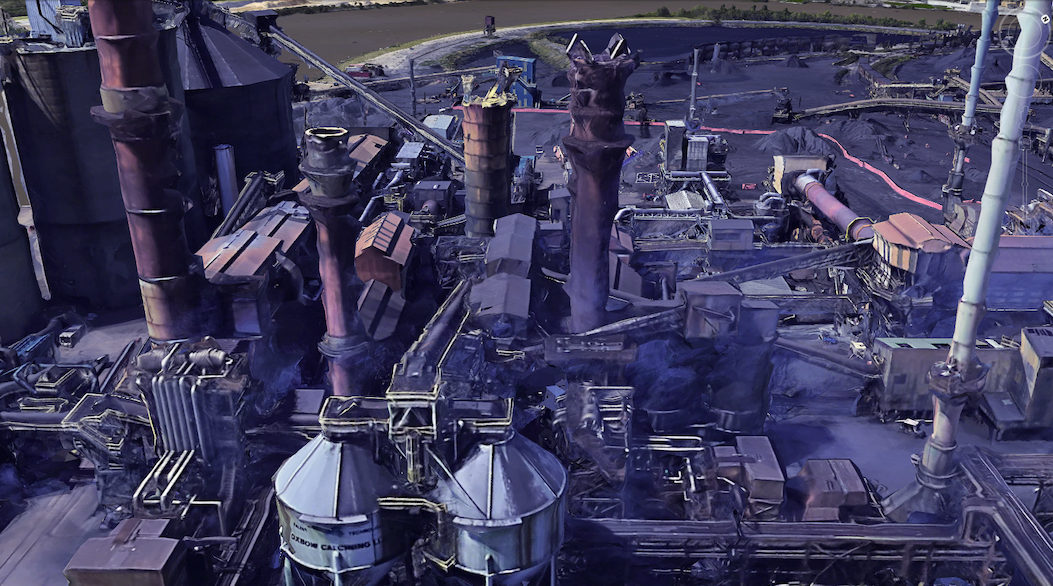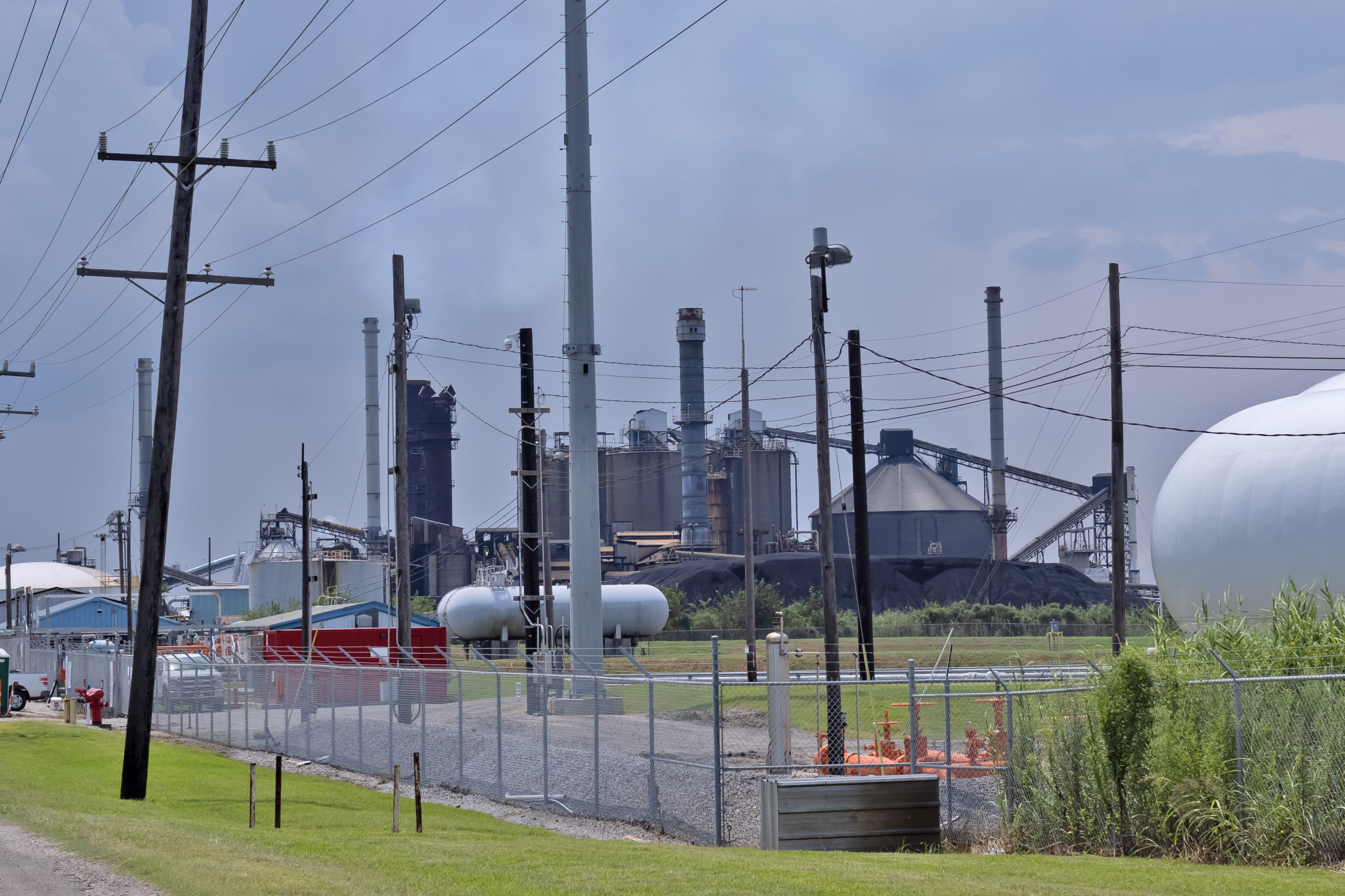
Small Plant, Big Polluter
Thanks to a loophole in the Clean Air Act, William Koch’s Oxbow plant in Port Arthur, Texas, puts out 10 times as much lung-damaging sulfur dioxide as its industrial neighbors. People who live nearby have asked the state for help, to no avail.
This story was jointly produced by Public Health Watch, the Investigative Reporting Workshop, and the Texas Observer.
Billionaire William Koch’s industrial plant in Port Arthur, Texas, is small compared to the three sprawling oil refineries that surround it – just 112 acres compared with the 10,000 acres occupied by Motiva, Valero and Total.
But Koch’s Oxbow facility towers over its neighbors in one respect.
It produces 10 times as much lung-damaging sulfur dioxide, SO2, as the three refineries combined. And it does so legally because of a quirk in the 1970 Clean Air Act, which allowed older facilities to delay complying with the law until they expanded or modernized.
As the refineries upgraded over the years, they installed sulfur scrubbers – large tanks that vacuum up most of the SO2. Their emissions dropped by 90 percent or more.
But the 86-year-old Oxbow plant, which manufactures something called calcined coke, hasn’t made any “major modifications” that would require it to fully comply with the federal act. Texas could set its own, tighter standards and require the plant to install scrubbers. But it hasn’t done that.
Today Oxbow releases as much SO2 – 22 million pounds a year – into Jefferson County as it did before the Clean Air Act was passed 51 years ago. That’s more than 80 percent of all the industrial SO2 emitted in a county that has one of the nation’s largest concentrations of petrochemical plants.
From the sky, the largely open-air facility looks like a black pockmark on the landscape, a jumble of rusting silos, boilers, pipes, kilns and towers cobbled together over time as intricately as a Jenga puzzle.
William Koch owns two other U.S. plants that make calcined coke – one in Enid, Oklahoma, and one in Baton Rouge, Louisiana. Both benefit from the Clean Air Act loophole. Like his plant in Port Arthur, neither has been fitted with scrubbers.
Koch is the youngest of four brothers. Two of them took over their late father’s company, Koch Industries Inc., and became famous for supporting conservative political causes. William, now 81, built his own business empire. Forbes puts his net worth at $2.1 billion.
Koch is renowned for his sailing exploits and for his art and wine collections. He’s also known for blocking construction of a wind farm off Cape Cod, which would have impaired the view from one of his mansions. He spent millions of dollars opposing the clean-energy project, asking, “Why would you want to sail in a forest of windmills?”
Koch and Oxbow declined, through a representative, to comment for this story.
‘You’re just on edge’
People who live near Koch’s Port Arthur plant look out on a vista of chemical plants and refineries, not the ocean.
Those most affected by Oxbow’s emissions live on the city’s west side, where Black residents were segregated in the early 20th century and built a thriving community. The narrow streets today are dotted with boarded-up homes and empty lots. A hazy, brown plume frequently trails over the neighborhood, bringing with it a foul smell.
Of the 2,600 people who live within three miles of the Oxbow plant, 98 percent are people of color and 62 percent have incomes of $53,000 or less for a family of four, according to an analysis by the Environmental Integrity Project.
West-siders who live closest to Oxbow suffer disproportionately from respiratory illness. They report a 13.7 percent asthma rate, according to the Centers for Disease Control and Prevention. The overall rate for Port Arthur is 10.5 percent. The national average is 8 percent.
Children, older adults and those with asthma are more likely to be hospitalized if they breathe large amounts of SO2. Long-term exposure can make people more susceptible to respiratory infections and damage their lungs. Children are at special risk.
When seemingly minor irritations, such as coughing, become chronic, the inflammation makes the immune system work overtime, said Dr. Albert Rizzo, chief medical officer for the American Lung Association.
“Ultimately it kind of decreases the defenses against viral or bacterial infections as well, so that can lead to more recurrent infections,” he said.
Etta Hebert, 63, who lives about two miles north of Oxbow, frequently suffers shortness of breath. Her husband and 2-year-old great-granddaughter also have trouble breathing. In May, she posted disturbing family photos on Facebook.
“All three of us were taking our breathing treatments at the same time,” she said. Her great-granddaughter “was on a breathing machine. I was on a breathing machine. My husband was on a breathing machine.
“This should not be a thing a family does.”

Proving Oxbow is the primary culprit in the illnesses that plague the west side isn’t easy because it’s almost impossible to link one person’s health problem to a specific smokestack. Port Arthur’s petrochemical plants spew many pollutants into the air, including benzene and 1,3-butadiene, which are both proven to cause cancer in humans. Although SO2 hasn’t been definitively linked to cancer, the World Health Organization classifies outdoor air pollution in general as a carcinogen.
In addition to coping with breathing problems, Hebert is surrounded by cancer. She lost her brother, her best friend, her mother and her first husband to the disease. She’s on her second bout of cancer and her daughter is in remission. Her current husband, who seemed to have overcome cancer, has been admitted to hospice care. At night she stays awake, waiting for the reassuring sound of him snoring.
“If I don’t hear him snore, I can’t sleep,” she said. “I have to just sit there and watch, you know?
“It feels overwhelming, so you block a lot of things. You’re not thinking. You’re just on edge.”
A multibillion-dollar global market
The Oxbow plant uses petroleum coke, or petcoke – a waste product from oil refineries – to produce calcined coke, a carbon substance used to make aluminum and other products. Raw petcoke is also used by China, India and other rapidly industrializing countries to run power plants, even though it’s a dirtier fuel than even coal.
Despite environmental and health concerns, petcoke’s multibillion-dollar global market continues to grow, because ever-more oil is being refined, creating ever-more petcoke as residue.
Koch’s company, West Palm Beach, Florida-based Oxbow Carbon LLC, is a leader in the growing petcoke market.
Ships carry raw coke from oil refineries around the world to the Oxbow facility on the banks of Taylor Bayou in Port Arthur. The powdery black coke is transferred into kilns a few feet away, where it is calcined – or baked at super-high temperatures – to remove impurities.
When the plant began operating in 1935, it was the first calcining plant in the United States to use rotary kilns. The long, cylindrical kilns revolve like cement mixers as they dry-heat the raw coke at 2,200 degrees Fahrenheit. The rattle of the churning petcoke can be heard across the facility.
To maintain this extreme heat, the plant burns some of its petcoke, whose combustion creates SO2. The heat and SO2 are expelled through smokestacks. The stacks also release particulate matter, which can irritate the lungs, cause shortness of breath, worsen conditions such as asthma and lead to heart disease. Long-term exposure to these fine particles has been linked to as many as 52,100 deaths in the U.S. each year.
State, EPA renew permits despite complaints
Residents have been trying – and failing – for years to get Oxbow’s SO2 emissions reduced. Their best opportunity comes every five years when Oxbow must renew its federal air permit. First, the state’s environmental watchdog, the Texas Commission on Environmental Quality (TCEQ) vets the application. Then the U.S Environmental Protection Agency gives final approval.
When the permit came up for renewal in 2019, about 40 people showed up at a TCEQ public hearing.
Michael Holtham, Oxbow’s plant manager at the time, defended the company at the meeting.
“We’re proud of our operations in Port Arthur, and the positive economic impact that we have in our community,” Holtham said. “As you know, our operations are highly regulated, and we work hard to maintain compliance with our environmental permits and other applicable requirements.”
But west side residents wanted to know why the billionaire-owned company won’t install scrubbers for the sake of the community. Several shared stories of relatives and friends who suffer from respiratory problems.
“Yes, we need jobs, but to what expense?” asked Hilton Kelley, a west-side resident who leads a local organization, Community In-Power and Development Association Inc. “We don’t need jobs so bad to where we’re willing to give up the lives of our children and our grandchildren, our mothers and fathers, and our grandparents and ourselves.”

It would cost Oxbow an estimated $56 million to install scrubbers and $10 million a year to operate them, according to information the company provided in a 2018 lawsuit involving a former business partner. According to Forbes, Oxbow’s annual revenue is about $2 billion.
The company’s executive vice president, Roy Schorsch, was asked in court why Oxbow hadn’t made that investment. Doing so, he replied, “has no payback potential except environmental compliance.
“It just will not economically pencil out,” he said later in his testimony.
In September 2020, the TCEQ and the EPA renewed Oxbow’s permit until 2025.
In response to the public’s objections, the TCEQ said it acted “in accordance with the applicable law, policy, procedures and the Agency’s mission to protect the state’s public health and natural resources consistent with sustainable economic development.”
Four nonprofit groups, including the Environmental Integrity Project and Lone Star Legal Aid, filed a petition with the EPA protesting the decision. They’re still waiting for a response more than a year later, even though the agency was legally obligated to respond within 60 days.
When asked about the petition, the EPA told Public Health Watch and the Investigative Reporting Workshop that it’s “currently in the process of responding to multiple petitions in Texas. One or more of the petitioners in the Oxbow Calcining title V petition are parties to the petitions we are currently in the process of addressing.”
Texas fails to close outdated loophole
The loophole that allows some industrial relics like Oxbow to avoid adopting modern pollution controls seemed logical when the Clean Air Act was enacted a half-century ago. Congress didn’t want older plants to be crippled by the potentially devastating cost of immediately upgrading their pollution controls. They’d be allowed to comply gradually, as they expanded or modernized.
“The theory was that no [industrial pollution] source can just keep operating forever without modifying or upgrading, because it’ll come to the end of its useful life,” said Victor Flatt, a University of Houston law professor and an expert on the Clean Air Act.
Over the years, however, the EPA narrowed its definition of “major modification.” Ever-more and bigger modifications were treated as minor repairs and maintenance, Flatt said.
“EPA, unfortunately, created an incentive to try to get the camel through the eye of the needle and get as big and many upgrades as possible without triggering a new-source performance review.”
Oxbow’s plant in Oklahoma, for example, was “modernized and automated” in the 1990s, according to the company’s website. But apparently none of the upgrades was big enough to require scrubbers.
Oklahoma, like Texas, could create regulations that would override the loophole because states have the authority to exceed federal air standards. California, for instance, created additional SO2 regulations specifically for calcining plants.
Texas already has many regulatory tools that could force Oxbow to install scrubbers, said Neil Carman, a former air pollution investigator for the state who is now clean air program director for the Sierra Club’s Texas chapter. But enforcing them to that extent would probably trigger a lawsuit from Oxbow, Carman said, something the TCEQ would prefer to avoid.
“The TCEQ has a history statewide of bending over backward for these older plants, letting them pollute the communities and not taking enforcement action,” Carman said.
John Beard, who spent 38 years as a processing technician at ExxonMobil, has watched that pattern play out for decades.
Beard grew up on Port Arthur’s west side and served nine years on the city council. After he retired in 2017, he founded the Port Arthur Community Action Network, or PACAN. His goal isn’t to shut down Oxbow or any of the other industrial facilities that fuel the local economy – he says he just wants them to reduce their pollution wherever they can, within reason.
“It’s not necessary for them to pollute to the extent that they do,” he said. “It’s a matter of choice, of dollars and cents. It makes sense to me that they invest their dollars in their facilities to make sure they minimize pollution impacts on the communities that surround them.”

TCEQ spokesman Gary Rasp wrote in an email that the agency “performs investigations of regulated industrial facilities, regardless of the age of the facility, and enforces against facilities that are not in compliance with applicable rules and regulations.”
Asked why the agency hadn’t taken action that would require the plant to install scrubbers, Rasp wrote, “Oxbow has not submitted an application to modify the plant that would trigger a control technology review” under the Clean Air Act.
But Beard says the TCEQ and the Texas Legislature need to do more. In June he wrote an opinion piece for the Port Arthur News, urging state representatives to join him in Port Arthur for a “toxic tour” of pollution. So far, he hasn’t had any takers.
“They can meet with residents like Mrs. Hebert who suffer daily from environmental exposure, property damage and depreciation and health issues from these facilities. Our representatives owe it to them to hear their stories,” Beard wrote.
Lax enforcement, paltry fines
Beard pointed to a 2017 industrial fire in Port Arthur as proof that enforcement is too lax and fines too paltry to protect the community.
The fire broke out at a storage facility owned by German Pellets, which makes wood pellets used for fuel. It burned for 102 days and created a noxious plume that blanketed nearby homes.
Kiah Fontenot-Young, 29, was pregnant at the time. She and her mother and grandmother were taken to the hospital, overcome by smoke. Doctors moved up Fontenot-Young’s scheduled C-section because they worried the smoke might affect her unborn child.
Fontenot-Young’s son, now 4, was born with asthma, an acute sensitivity to allergens and behavioral and developmental issues, which she attributes to the smoke. Her 82-year-old grandmother is on two separate oxygen machines, three inhalers and a CPAP machine.
“She’s basically walking around suffocating,” Fontenot-Young said. “For the rest of her life, she’s slowly suffocating.”

The TCEQ fined German Pellets $12,000 for failing to prevent “nuisance odor conditions,” a penalty so small that Beard saw it as disrespectful to his community.
“There are some who believe if we put too much of an onus on them to clean up their act, then these companies will leave,” Beard said. “They’ve made billions of dollars all these years … These cities ought to be flush with cash. It’s far from the case. Port Arthur looks like Beirut, bombed out and depleted.”
Rasp, the TCEQ spokesman, said the agency considered the fire’s “impact to human health or the environment” when determining the fine.
More than 600 people are seeking up to $25 million in damages from German Pellets for illnesses they said they suffered from inhaling the fire’s smoke and chemicals, and for emotional distress and property damage. The trial is tentatively scheduled for December.
Measure to strengthen law dies in Texas House
In February, state Rep. Erin Zwiener, a Democrat from suburban Austin, introduced legislation she hoped would make life better for Texans living in industrial neighborhoods such as Port Arthur’s west side.
HB 1820 would have increased the maximum penalties for polluters. It also would have allowed the TCEQ to tack on additional penalties for companies with a history of violations and would have eliminated loopholes that allow many violators to avoid paying fines.
But the speaker of the Texas House, Dade Phelan, a Republican from Beaumont, allowed the bill to die, even though his district had suffered its own disaster just a few years earlier.
In 2019, an explosion at a petrochemical plant in Port Neches, just outside Beaumont, forced 50,000 residents from their homes. At the time, Phelan seemed eager for new regulations. He urged the legislature “to ensure all plants and refineries are following the necessary procedures to ensure the safety of their workers and the citizens that live in the surrounding communities.”
Phelan didn’t respond to questions about why he didn’t support Zwiener’s bill.
TCEQ violates human rights, complaint says
In August, west-siders tried a new tactic to force Oxbow to reduce its pollution. With the help of the nonprofit groups that have been representing them over the years, they filed a civil rights complaint with the EPA.
It accused the TCEQ of violating the civil rights of the residents of the mostly Black community “by allowing dangerous amounts of air pollution to pour from an industrial plant for years, without any modern pollution controls.”
Public Health Watch and the Investigative Reporting Workshop asked the TCEQ whether it had considered civil rights when issuing Oxbow’s latest permit.
Rasp, the TCEQ spokesman, replied that the agency “is fully committed to protecting the health of all the citizens of Texas and its environment, regardless of race or socioeconomic status.”
In October, the EPA announced it had accepted the complaint and was beginning an investigation.
Meanwhile, a new wave of people is moving to the west side – people in search of homes they can afford.
“They don’t know the danger they’re moving into — but they call it cheap housing,” said Beard, whose organization, PACAN, joined the EPA complaint. “You know, some people are willing to put up with it. But why should you have to put up with it? Everybody has a right to clean air. Everybody has a right to be able to live and be healthy.”
Top image: An aerial view of the Oxbow plant in Port Arthur, Texas. Credit: Google Earth.



